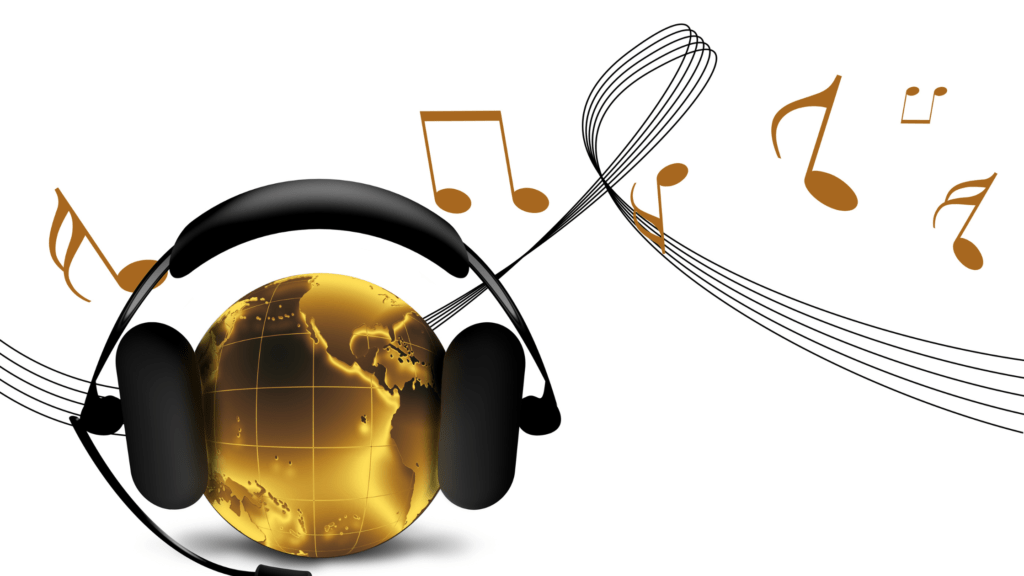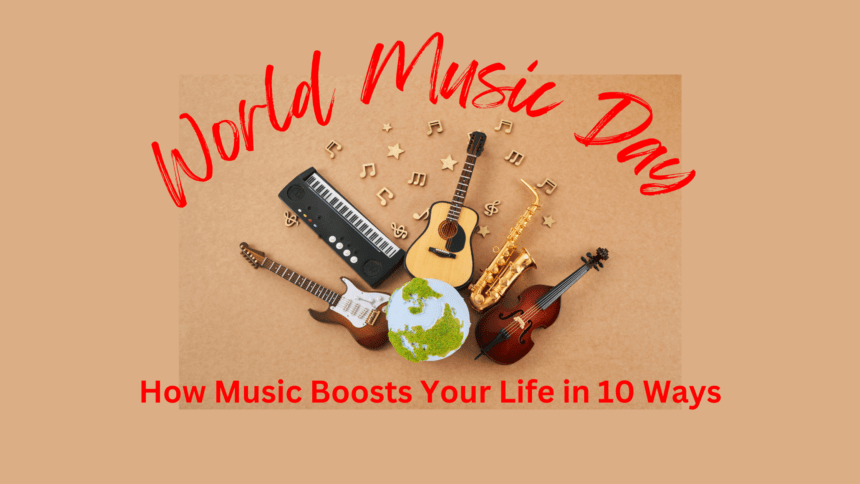Introduction
World Music Day, celebrated globally on June 21st, is more than just an ode to melodies and rhythms. It symbolizes the profound connection between humans and music, transcending borders, languages, and cultures. The day is a reminder of the universal appeal of music and its extraordinary ability to heal, uplift, and unite. As we celebrate World Music Day 2024, it is important to explore the various benefits of music and understand how it enhances our lives in myriad ways.
13 Benefits of Music You Didn’t Know About
Music and Mental Health
One of the most significant benefits of music is its impact on mental health. Listening to calming tunes or engaging in music-making activities significantly reduces anxiety and stress levels. The soothing rhythms and harmonies provide a therapeutic escape, fostering a sense of tranquility. This ability to calm the mind is one of the primary reasons why music therapy is widely used in mental health treatment. Moreover, music has the power to elevate moods, acting as a natural antidepressant. Upbeat songs can energize and inspire, while melancholic melodies offer solace and understanding, helping listeners process their emotions. The emotional benefits of music are profound, making it a vital tool in mental health care.
Cognitive Benefits
Another crucial aspect of the benefits of music is its positive impact on cognitive functions. Engaging with music can enhance cognitive abilities in several ways. Studies have shown that listening to music, especially classical, improves memory retention and recall abilities. This is because music stimulates various parts of the brain, promoting neural connections that enhance memory. Additionally, music stimulates creative thinking and problem-solving skills, making it a vital tool in educational settings and innovative industries. The cognitive benefits of music extend to all age groups, providing lifelong advantages.
Physical Health Advantages
The physical health benefits of music are equally impressive. Music therapy has been used to manage pain effectively, providing relief for patients undergoing various treatments. Rhythmic and melodic elements distract from discomfort and promote relaxation, which can be incredibly beneficial during medical procedures or recovery periods. Furthermore, listening to music can improve cardiovascular health by reducing blood pressure and heart rate, leading to overall better physical well-being. These benefits of music demonstrate its potential as a non-invasive, cost-effective treatment for various physical health issues.

Music and Sleep Quality
For those struggling with sleep disorders, the benefits of music offer a natural remedy. Listening to calming music before bedtime promotes relaxation and prepares the mind for sleep. This practice can significantly reduce insomnia symptoms, leading to better sleep quality and overall health. The repetitive, soothing nature of music can help to quiet the mind and reduce the distractions that often prevent restful sleep. Incorporating music into a bedtime routine is a simple yet effective way to improve sleep hygiene and overall well-being.
Emotional Expression
Music serves as a powerful medium for emotional expression, offering one of the most profound benefits of music. It allows individuals to convey feelings that might be difficult to articulate with words. This emotional outlet enhances empathy and understanding, fostering deeper connections between people. Through lyrics, melodies, and harmonies, music can capture the full range of human emotions, from joy to sorrow, anger to peace. This ability to express and process emotions makes music an invaluable tool for emotional health and personal growth.
Social Connectivity
The social benefits of music are vast, with music having the unique ability to bring people together. Whether through concerts, community choirs, or informal jam sessions, music builds social bonds and strengthens communities. It also facilitates cultural exchange, allowing people from diverse backgrounds to share and appreciate each other’s traditions and experiences. The communal experience of music can break down barriers and create a sense of unity, highlighting the universal language of music and its power to connect us all.
Educational Benefits
In educational settings, the benefits of music play a crucial role in language development and learning. Children exposed to music from an early age show improved linguistic skills and cognitive development. Music also creates a stimulating learning environment, making education more engaging and effective. Integrating music into the classroom can enhance students’ ability to concentrate, retain information, and develop critical thinking skills. The educational benefits of music are well-documented, supporting its inclusion in curricula worldwide.
Productivity and Focus
In the workplace, music can enhance productivity and focus, offering significant benefits of music in professional settings. Background music with a steady rhythm can improve concentration and efficiency, helping individuals stay on task. Creating an optimal work environment with music can lead to better performance and job satisfaction. The benefits of music in the workplace extend to reducing stress and enhancing creativity, making it a valuable asset for both employees and employers.
Therapeutic Applications
Music therapy is widely used in medical settings to aid recovery and rehabilitation, showcasing the therapeutic benefits of music. It helps patients cope with the emotional and physical challenges of their conditions. From aiding stroke recovery to improving motor skills in patients with Parkinson’s disease, the therapeutic applications of music are vast and varied. Music therapy can also alleviate symptoms of chronic illnesses, provide comfort in palliative care, and support mental health treatment. The therapeutic benefits of music underscore its importance in comprehensive healthcare.

Music as a Motivational Tool
Music is a powerful motivator, especially in physical exercise and sports, highlighting the benefits of music for physical performance. Upbeat and energetic tunes can inspire individuals to push their limits, enhancing performance and endurance. Music’s rhythmic elements synchronize with physical movements, making workouts more enjoyable and effective. Whether running, lifting weights, or practicing yoga, the right music can transform a routine exercise session into an invigorating experience, illustrating the motivational benefits of music.
Spiritual and Cultural Significance
Music holds deep spiritual and cultural significance, connecting individuals to their cultural roots and traditions, and providing profound benefits of music in these areas. It fosters a sense of identity and belonging, and in spiritual practices, music facilitates transcendent experiences, offering a pathway to mindfulness and inner peace. The cultural benefits of music include preserving heritage, promoting intercultural understanding, and fostering a sense of community among diverse populations. The spiritual and cultural benefits of music highlight its role in enriching human experience and fostering global harmony.
Music and Aging
For older adults, music can be a source of comfort and cognitive stimulation, providing significant benefits of music in aging populations. Listening to familiar songs helps maintain cognitive function and can evoke cherished memories, reducing feelings of loneliness and isolation. Music can also enhance social interactions and provide a sense of purpose and joy in later life. The benefits of music for aging individuals extend to improving mental health, physical well-being, and overall quality of life.
Technological Impact
The advent of technology has revolutionized access to music, amplifying the benefits of music through modern innovations. Streaming services have made music more accessible than ever, allowing people to explore a vast array of genres and artists. Innovations in music therapy technology continue to enhance its effectiveness, providing new tools for healing and well-being. From mobile apps to virtual reality experiences, technology is expanding the ways we can harness the benefits of music for health, education, and personal enjoyment.
Conclusion
As we celebrate World Music Day 2024, it’s essential to recognize and embrace the healing power of music. The benefits of music extend far beyond mere entertainment, touching every aspect of our lives. From mental health to social connectivity, music enriches our existence, making the world a more harmonious place. Embracing the benefits of music can lead to a healthier, happier, and more connected society, highlighting the timeless and universal power of this art form.

For more content follow Humstory













